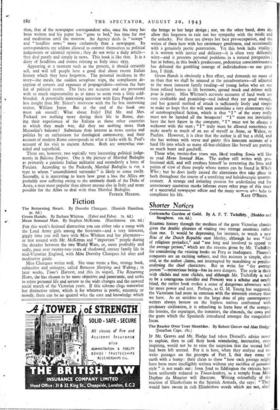Shorter Notices RELDING history through the medium of the great
Victorian classics gives the double pleasure of visiting two strange countries rather than one. It would be depressing, for instance, to watch a new Rise of the Dutch Republic oust Motley, although he was full of religious prejudice," and " too long and involved to appeal to the average person," which are the reasons given by Mr. Tschiffely for consideting the existing books on Peru as inadequate. Pizarro's conquests are an exciting subject, and this account is simple, clear and, as the author Maims, not interrupted by moralising or psycho- analysing the chief characters. But to write for " the average person "—mysterious being—has its own dangers. The style is thick with cliches and near cliches, and although Mr. Tschiffely is said to be a courageous traveller and Prescott was a scholar and nearly blind, the cattier book evokes a sense of dangerous adventure with far more power and zest. Perhaps, as G. M. Young has suggested, the Victorians had more in common with the sixteenth century than we have. As an antidote to the large dose of pity contemporary writers always bestow on the hapless natives confronted with predatory civilisation, it is refreshing to learn here of the oranges, the lemons, the asparagus, the tomatoes, the almonds, the cows and the goats which the Spaniards introduced amongst the vanquished Incas.


























 Previous page
Previous page